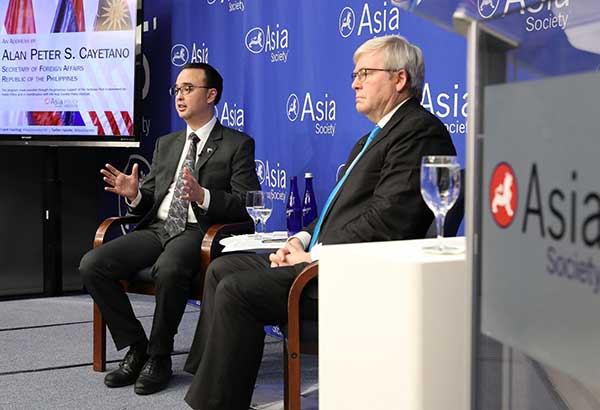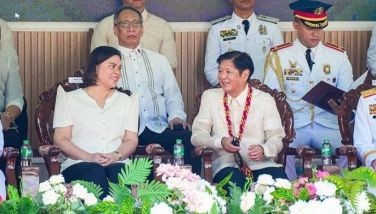Philippines on HR record: Nothing to hide

Foreign Affairs Secretary Alan Peter Cayetano answers questions from former Australian Prime Minister and president of the Asia Society Policy Institute Kevin Rudd in an event at the Asia Society in New York City last Sept. 21.
MANILA, Philippines — Despite the Duterte’s government’s refusal to let the United Nations special rapporteur on summary killings conduct an independent probe in the country, Foreign Affairs Secretary Alan Peter Cayetano insisted that the Philippines has nothing to hide in connection with its human rights record.
Cayetano – who is in New York to attend the UN General Assembly – lauded the adoption of the Philippine report of its third Universal Periodic Review (UPR) during the UN Human Rights Council (UNHRC) session in Geneva, Switzerland on Friday.
“The final adoption of our UPR Report during the 36th Regular Session of the Human Rights Council in Geneva demonstrates that the Philippines has nothing to hide with its human rights record,” Cayetano said in a statement yesterday.
“The Philippines will remain resolute in its respect for and protection of human rights as it strives to improve the lives and welfare of each and every Filipino by protecting them from the scourges of drugs and criminality,” he added.
Cayetano issued the statement even as the Philippines received criticism for accepting only 103 of the 257 recommendations made by UN member-states during the dialogue held in May.
Among those that the country did not accept were recommendations to allow UN special rapporteur on extrajudicial Agnes Callamard to conduct an official visit without any conditions.
Also rejected were recommendations urging the country to investigate reported summary killings in connection with the government’s campaign against illegal drugs.
The Philippines also said it could not fully support those that urge the country to refrain from reinstating the death penalty and lowering the minimum age of criminal liability.
Evan Garcia, Philippine Permanent Representative to the UN in Geneva, said the country could not fully support 55 recommendations because these “were sweeping, vague and even contradictory, especially in the context of the Philippines’ democratic processes.”
With regard to the remaining 99 recommendations, Garcia said the Philippines could not fully commit to them as these are beyond the sole control of any of the branches of the government.
“This is specifically true for recommendations that pertain to legislative action, which would require consultative processes with stakeholders,” he said.
On extrajudicial killings, the Philippines has claimed that the cases have been fully addressed before, referring to the government’s repeated denial that such cases exist.
The delegations of the United States and United Kingdom were among those that expressed regret over Manila’s decision not to accept recommendations involving the thousands of deaths in connection with the war on drugs.
But Cayetano maintained that the dignity of the Filipino people is a priority of the Duterte government.
“The Philippines remains fully committed to meeting its human rights obligations in compliance with the Constitution and international human rights obligations,” he said.
Garcia said the Philippine participation in the review shows its commitment to engage the UN HRC and take part in international human rights mechanisms.
“The accepted recommendations mirrored the recommending States’ understanding of the current human rights situation in the Philippines, recognized and respected the State as currently implementing or having implemented them, and were supportive of the Philippines’ pursuit of human rights aimed at uplifting human dignity,” he added.
The Philippines fully accepted recommendations that pertained to the sustainable protection of family and society in general, including preservation of the sanctity of family life, effective advocacy of economic and social rights through development, mitigation of the adverse effects of climate change, eradication of poverty and improvements to access to health care and public education.
Also accepted were those aimed at enhancing the current capacities of the country to protect the right to life, liberty and property through the rule of law and accessibility of victims to justice in pursuit of anti-abortion initiatives, eradication of all forms of slavery, counter-terrorism efforts and the anti-illegal drugs campaign.
The rest of the recommendations that were fully accepted include strengthening international cooperation with human rights mechanisms for the protection of the most vulnerable sectors in Philippine society and the formulation of the national human rights action plan.
Palace welcomes Phl report adoption
Malacañang yesterday welcomed the adoption of the Philippine report of its third UPR.
“The unanimous adoption of the UPR Report in Geneva signifies the UN’s recognition of the country’s human rights record under the leadership of President Duterte,” presidential spokesman Ernesto Abella said.
“This likewise reaffirms our respect for the dignity of the Filipino people and the protection of the Filipino family as we strive for a better life in a society free of illegal drugs and other crimes,” he added.
The Palace also congratulated the efforts of Cayetano, Senior Deputy Executive Secretary Menardo Guevarra, Undersecretary Severo Catura of the Presidential Commission on Human Rights and the rest of the members of the Philippine government UPR team, Garcia and the team at the Philippine Mission to the UN in Geneva.
Abella lauded the team “for their tireless efforts in explaining to the world our policies, practices, commitments and obligations in the area of human rights.”
Malacañang is also upbeat on the recent survey of the Pew Research Center, an American think tank, which showed that the administration’s campaign against crime and illegal drugs continues to get unwavering support from the public.
According to the survey, 86 percent of Filipinos have a favorable view of President Duterte while 78 percent of Filipinos approve of his handling of the illegal drugs issue.
The survey also showed that 62 percent of Filipinos believe that the government is making progress in its campaign against illegal drugs.
“The campaign against illegal drugs, as the President said, would be relentless until the drug apparatus is dismantled, the last drug pusher is out of the streets and the last drug trafficker is behind bars,” Abella said. – With Christina Mendez
- Latest
- Trending































